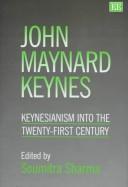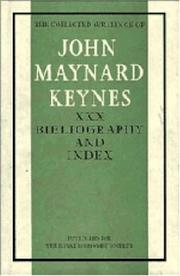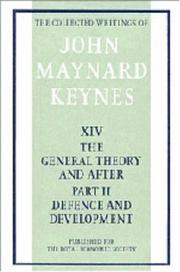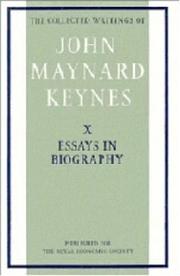| Listing 1 - 10 of 77 | << page >> |
Sort by
|
Book
ISBN: 9780007519828 0007519826 Year: 2015 Publisher: London William Collins
Abstract | Keywords | Export | Availability | Bookmark
 Loading...
Loading...Choose an application
- Reference Manager
- EndNote
- RefWorks (Direct export to RefWorks)
08 --- Keynes, John Maynard --- Economic schools --- Keynes, J. Maynard --- Keynes, J.M.
Book
ISBN: 1009255045 1009255053 1009255029 1009255010 9781009255042 9781009255059 9781009255028 Year: 2022 Publisher: New York, NY : :Cambridge University Press,
Abstract | Keywords | Export | Availability | Bookmark
 Loading...
Loading...Choose an application
- Reference Manager
- EndNote
- RefWorks (Direct export to RefWorks)
John Maynard Keynes died in 1946 but his ideas and his example remain relevant today. In this distinctive new account, Peter Clarke shows how Keynes's own career was not simply that of an academic economist, nor that of a modern policy advisor. Though rightly credited for reshaping economic theory, Keynes's influence was more broadly based and is assessed here in a rounded historical, political and cultural context. Peter Clarke re-examines the full trajectory of Keynes's public career from his role in Paris over the Versailles Treaty to Bretton Woods. He reveals how Keynes's insights as an economic theorist were rooted in his wider intellectual and cultural milieu including Bloomsbury and his friendship with Virginia Woolf as well as his involvement in government business. Keynes in Action uncovers a much more pragmatic Keynes whose concept of 'truth' needs to be interpreted in tension with an acknowledgement of 'expediency' in implementing public policy.
Economists --- Keynes, John Maynard, --- Great Britain --- Economic policy --- Keynes, J. Maynard --- Keynes, J.M.

ISBN: 1858986532 Year: 1998 Publisher: Cheltenham Elgar
Abstract | Keywords | Export | Availability | Bookmark
 Loading...
Loading...Choose an application
- Reference Manager
- EndNote
- RefWorks (Direct export to RefWorks)
Keynesian economics --- Keynes, John Maynard --- Post-Keynesian economics --- Schools of economics --- Keynes, J. Maynard --- Keynes, J.M.
Book
ISBN: 3030913422 3030913414 Year: 2022 Publisher: Cham, Switzerland : Springer,
Abstract | Keywords | Export | Availability | Bookmark
 Loading...
Loading...Choose an application
- Reference Manager
- EndNote
- RefWorks (Direct export to RefWorks)
Keynesian economics. --- Keynes, John Maynard, --- Post-Keynesian economics --- Schools of economics --- Keynes, J. Maynard --- Keynes, J.M.

ISBN: 0333241762 0521230764 1107695090 1139524305 Year: 1989 Publisher: London : New York : Macmillan ; Cambridge U.P. for the Royal economic society,
Abstract | Keywords | Export | Availability | Bookmark
 Loading...
Loading...Choose an application
- Reference Manager
- EndNote
- RefWorks (Direct export to RefWorks)
This volume marks the completion of the Collected Writings. The general index to the edition is designed to allow those interested in the development of Keynes's thought, and those interested in the history of economic thought more generally, to trace the development of his ideas throughout his career. The bibliography to the edition records all the writings of Keynes published not only in English but also in translation. It provides an indication of the process by which Keynes's writings were disseminated throughout the world. In addition, this volume includes an editorial introduction describing the principles of selection used by the editors, as well as a few items that escaped them in the preparation of earlier volumes. This volume is an essential tool for the effective use of the material in the twenty-nine other volumes of this edition.
Economic schools --- Keynes, John Maynard --- Keynes, John Maynard, --- Keynesian economics. --- Economists --- Social scientists --- Post-Keynesian economics --- Schools of economics --- Keynes, J. Maynard --- Keynes, J.M.

ISBN: 1139524267 0521221048 1107667933 Year: 2013 Publisher: Cambridge : Cambridge University Press for the Royal Economic Society,
Abstract | Keywords | Export | Availability | Bookmark
 Loading...
Loading...Choose an application
- Reference Manager
- EndNote
- RefWorks (Direct export to RefWorks)
This volume, with its companion, Volume 13, provides all the surviving letters, drafts and articles arising from Keynes's work as a monetary economist between 1924 and 1939. It contains wherever possible both sides of all correspondence concerning his Treatise on Money and General Theory, both before and after publication, as well as complete texts of all surviving drafts of both works. In addition it contains important correspondence concerning D. H. Robertson's Banking Policy and the Price Level and such post-General Theory contributors as R. F. Harrod's first work on the theory of economic growth. As such, it provides a remarkable chronicle of one man's intellectual development over the quarter of a century that saw a revolution in economics.
Keynesian economics. --- Monetary policy. --- Monetary management --- Economic policy --- Currency boards --- Money supply --- Post-Keynesian economics --- Schools of economics --- Keynes, John Maynard, --- Keynes, J. Maynard --- Keynes, J.M.

ISBN: 1139524232 0521221021 1107656435 Year: 2013 Publisher: Cambridge : Cambridge University Press for the Royal Economic Society,
Abstract | Keywords | Export | Availability | Bookmark
 Loading...
Loading...Choose an application
- Reference Manager
- EndNote
- RefWorks (Direct export to RefWorks)
Most of the essays in this book were first collected and published in 1933, when Keynes had reached a turning point in a highly successful career as an academic economist, as an official economic advisor, opponent of the reparation imposed on Germany and critic of the orthodox economic policies of British governments. Before devoting himself fully to the final stages of his journey towards The General Theory, Keynes put together these examples of one of his favourite literary genres, the psychological portrait and biographical sketch. With the additions made in 1951 and 1972, the book contains almost all of Keynes's biographical writings: his savage portraits of the architects of the Treaty of Versailles and sketches of other politicians, including Asquith and Churchill; some classic accounts of the lives of economists; a pair of autobiographical memoirs; a short study of Newton; and many acute and affectionate character sketches of friends.
Regions & Countries - Europe --- History & Archaeology --- Great Britain --- Keynes, John Maynard, --- Friends and associates. --- Keynes, J. Maynard --- Keynes, J.M. --- Economists --- Statesmen
Book
ISBN: 2717820582 Year: 1991 Publisher: Paris Economica
Abstract | Keywords | Export | Availability | Bookmark
 Loading...
Loading...Choose an application
- Reference Manager
- EndNote
- RefWorks (Direct export to RefWorks)
Keynesian economics --- 330.47 --- AA / International- internationaal --- Post-Keynesian economics --- Schools of economics --- Keynes en zijn school --- Keynes, John Maynard --- Keynes, J. Maynard --- Keynes, J.M.
Book
ISBN: 1852784008 9781852784003 Year: 1992 Publisher: Aldershot: Elgar,
Abstract | Keywords | Export | Availability | Bookmark
 Loading...
Loading...Choose an application
- Reference Manager
- EndNote
- RefWorks (Direct export to RefWorks)
Keynes, John Maynard --- Keynesian economics --- Keynes, John Maynard, --- AA / International- internationaal --- 330.47 --- Keynes en zijn school. --- Post-Keynesian economics --- Schools of economics --- Keynes en zijn school --- Keynes, J. Maynard --- Keynes, J.M. --- Keynes, John Maynard, - 1883-1946
Book
ISBN: 9780674057753 Year: 2011 Publisher: Cambridge, MA ; London Harvard University Press
Abstract | Keywords | Export | Availability | Bookmark
 Loading...
Loading...Choose an application
- Reference Manager
- EndNote
- RefWorks (Direct export to RefWorks)
"The Great Recession of 2008 restored John Maynard Keynes to prominence. After decades when the Keynesian revolution seemed to have been forgotten, the great British theorist was suddenly everywhere. The New York Times asked, "What would Keynes have done?" The Financial Times wrote of "the undeniable shift to Keynes." Le Monde pronounced the economic collapse Keynes's "revenge." Two years later, following bank bailouts and Tea Party fundamentalism, Keynesian principles once again seemed misguided or irrelevant to a public focused on ballooning budget deficits. In this readable account, Backhouse and Bateman elaborate the misinformation and caricature that have led to Keynes's repeated resurrection and interment since his death in 1946. Keynes's engagement with social and moral philosophy and his membership in the Bloomsbury Group of artists and writers helped to shape his manner of theorizing. Though trained as a mathematician, he designed models based on how specific kinds of people (such as investors and consumers) actually behave -- an approach that runs counter to the idealized agents favored by economists at the end of the century. Keynes wanted to create a revolution in the way the world thought about economic problems, but he was more open-minded about capitalism than is commonly believed. He saw capitalism as essential to a society's well-being but also morally flawed, and he sought a corrective for its main defect: the failure to stabilize investment. Keynes's nuanced views, the authors suggest, offer an alternative to the polarized rhetoric often evoked by the word "capitalism" in today's political debates."--From the dust-jacket front flap.
Keynes, John Maynard, --- Keynesian economics --- AA / International- internationaal --- 330.47 --- Post-Keynesian economics --- Schools of economics --- Keynes en zijn school. --- Keynes en zijn school --- Keynes, John Maynard --- Keynes, J. Maynard --- Keynes, J.M. --- Economic schools
| Listing 1 - 10 of 77 | << page >> |
Sort by
|

 Search
Search Feedback
Feedback About UniCat
About UniCat  Help
Help News
News